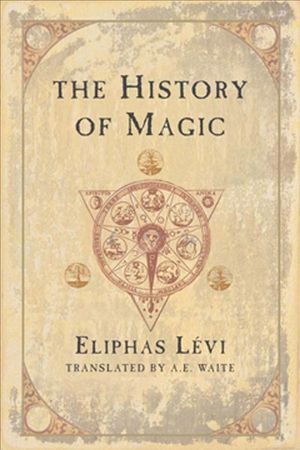The History of Magic
Published by Red Wheel/Weiser
An extensive classic work on the origins of ceremonial magic throughout the world’s many cultures and religions.
French occultists Alphones Louis Constant (1810–1875) was born in Paris to a shoemaker father. At age twenty-two, he entered the seminary at Saint Sulpice for an education that would prepare him for the priesthood. While he did become ordained a deacon, he found that his doubts regarding the doctrine of the Catholic Church precluded him from completing his ordination. A week before he was due to take orders as a priest, he left the Church and returned to civilian life.
Through the 1850s and 1860s, Constant developed and disseminated his growing ideas of the occult, mysticism, and the Kabbalistic school of thought. He became a ceremonial magician and developed a social circle of other mystical and occultist thinkers. Eschewing the charlatan’s tricks and parlor illusions, Lévi believed that the practice of ceremonial magic required a strong will, psychic force, and powerful imagination to discover true science and influence reality. And anyone who attempted to use magic for personal gain would lead to their own destruction.
Writing under the name Éliphas Lévi—a literal translation of his name Alphonse Lewis into Hebrew—he began to share his ideas on magic with the public. In 1860, he began work on The History of Magic, an assessment and analysis of sacred magic through many past cultures. By exploring the magical components of the pagans, Kabbalists, ancient Greeks, Chinese, Indians, Catholics, and many other groups, Lévi sought to find the secret wisdom hidden within each. He also explored the secret traditions of the Illuminati, Freemasons, and the Knights Templar, among many others.
The History of Magic is an essential test for any student of ceremonial magic, revealing the truths behind the fables, allegories, and parables of these cultural traditions. Translated into English by the British poet and mystic, A.W. Waite, it was published posthumously in 1913. Waite was one of the creators of the well-known Rider-Waite Tarot Deck, one of the most widely used tarot decks in the world.
French occultists Alphones Louis Constant (1810–1875) was born in Paris to a shoemaker father. At age twenty-two, he entered the seminary at Saint Sulpice for an education that would prepare him for the priesthood. While he did become ordained a deacon, he found that his doubts regarding the doctrine of the Catholic Church precluded him from completing his ordination. A week before he was due to take orders as a priest, he left the Church and returned to civilian life.
Through the 1850s and 1860s, Constant developed and disseminated his growing ideas of the occult, mysticism, and the Kabbalistic school of thought. He became a ceremonial magician and developed a social circle of other mystical and occultist thinkers. Eschewing the charlatan’s tricks and parlor illusions, Lévi believed that the practice of ceremonial magic required a strong will, psychic force, and powerful imagination to discover true science and influence reality. And anyone who attempted to use magic for personal gain would lead to their own destruction.
Writing under the name Éliphas Lévi—a literal translation of his name Alphonse Lewis into Hebrew—he began to share his ideas on magic with the public. In 1860, he began work on The History of Magic, an assessment and analysis of sacred magic through many past cultures. By exploring the magical components of the pagans, Kabbalists, ancient Greeks, Chinese, Indians, Catholics, and many other groups, Lévi sought to find the secret wisdom hidden within each. He also explored the secret traditions of the Illuminati, Freemasons, and the Knights Templar, among many others.
The History of Magic is an essential test for any student of ceremonial magic, revealing the truths behind the fables, allegories, and parables of these cultural traditions. Translated into English by the British poet and mystic, A.W. Waite, it was published posthumously in 1913. Waite was one of the creators of the well-known Rider-Waite Tarot Deck, one of the most widely used tarot decks in the world.
BUY NOW FROM
COMMUNITY REVIEWS

